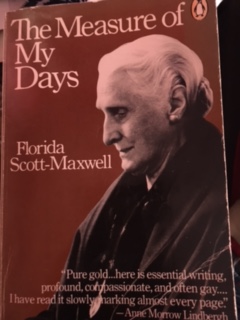For the past few weeks, I’ve been haunted by a paragraph from Florida Scott-Maxwell’s The Measure of My Days*. Actually, it would be more accurate to say that I’ve been haunted by Florida Scott-Maxwell herself, and not just for the past few weeks but for the past twenty-five years! (Was it my Gramma Jewell who gave me The Measure of My Days? Seems like something she’d have read and shared with me.)

I’ve also been haunted by Ursula K. Le Guin, but that’s a tale to be taken up some other time.
Here’s the passage from Scott-Maxwell which has possessed me:
Age puzzles me. I thought it was a quiet time. My seventies were interesting, and fairly serene, but my eighties are passionate. I grow more intense as I age. To my own surprise I burst out with hot conviction. Only a few years ago I enjoyed my tranquility; now I am so disturbed by the outer world and by human quality in general that I want to put things right, as though I still owed a debt to life. I must calm down. I am far too frail to indulge in moral fervor. (p. 14)
There are two things you need to know about this passage: First, it comes from a book (based on Scott-Maxwell’s personal journals) first published in 1968 – 50 years ago! Second, don’t let this passage fool you into thinking that in her old age Scott-Maxwell calmed down or stopped indulging in “moral fervor” about the state of the world. Read her book and you’ll see for yourself.
Her every word is a call to action. Her every sentence opens space for engaging in the life-long work of knowing one’s self, loving other people, and living a life “of fierce energy” especially when we are at our most frail, uncertain, or diminished.
+++

Here in Portland we had a snow day (Hooray!).
Happy-the-dog and I headed to the park shortly after breakfast. The playground was full of kids and dogs and grown-ups. I watched as two toddlers slid down a (very) little hill of snow in (very) little plastic sleds. Their grown-up stood at the sidelines shouting encouragement and congratulations for their bravery: “Hooray!” and “Good job!” and “Wow, that was fast!”
I remembered snow days enjoyed with my own toddler – now twenty years ago! Ah, the wonderment of being awoken by odd snow-light reflecting off the bedroom walls, knowing that we’d get to play together all day (and make snow slushies, off course). I’ll give you one major holiday and a long vacation in exchange for a few snow days. Deal?
Walking on along the path beside the almost-frozen stream, one of my favorite birds, the awesome kingfisher, barreled toward me, loudly proclaiming his sovereignty. Two school-age kids and their grown-up were standing at the edge of the stream observing a domesticated duck someone had abandoned in the park. I saw their attention rivet to kingfisher as he flew by. I asked if they knew who he was, and the grown-up said, “You mean the bird that just flew by with hair that looks like a blue jay?” I confess to you, reader: I knew who kingfisher was, and I wanted to be able to experience the thrill of seeing him with others; basically, I set them up. I proceeded to let them know all about kingfisher – he prefers solitude, but he also enjoys displaying himself; for such a small creature he’s a sassy loudmouth; he has the best blue mohawk ever (and look, he’s about to dive into the stream to catch a fish!). They seemed glad to know about kingfisher, though their reactions were mild in the face of such splendor. Hopefully they’ll never again mistake kingfisher for a blue jay! I can’t imagine either bird would be too terribly happy to be mistook.)
On we walked. By the time we reached the bridge on the North end of the park, kingfisher was making his way back down the stream toward us. Right before he reached us he landed in a tree. I took a quick look around to make sure there weren’t any witnesses and then I did what I often do when I see kingfisher. I shouted, “Kingfisher, hello!” He rattled back. And then I realized I wasn’t the only human there! A person who looked to be in their teenage-stage walked up and asked if they could talk to Happy-dog. (Phew—I thought they were going to ask me why I was talking to kingfisher!) I let them know that Happy sometimes grows concerned around new people and then I gently held Happy’s head while the person stroked his nose. I told them Happy’s name, and they remarked that Happy looked sad and then laughed. I said that I didn’t think so, that probably Happy was just a bit confused about what was happening, but otherwise he loved taking a walk in the snow. They said, yeah that makes sense; Happy seems sweet. I said, yup he’s the sweetest creature ever.
+++
Elsewhere today other things were happening. In Florida, school buses took loads of young activists to the state capital to demand gun reform. Many young comrades around the country staged protests in solidarity. They are begging, demanding that the “grown-ups” listen. And do something.
I feel inspired by their conviction that, to quote Scott-Maxwell, they want to “put things right.” At the early stages of their travels through the life-course they already feel they owe “a debt to life.”
I feel ashamed that the grown-ups – I include myself here – who are supposed to protect them, to ensure that they have safe and vibrant spaces in which to learn and grow, have failed them so consequentially and miserably.
I don’t know those young activists, those soon-to-be grown-ups (who only a handful of years ago were themselves toddlers). And I’m not really sure how best to help as I stand on the sidelines. God, I remember how I felt when I was a young activist protesting against nuclear bombs. I remember how I felt to not be listened to, to realize that none of the grown-ups could or would protect me. Now the kids in Florida and across the country know for certain that grown-ups can’t promise them that all is well and that they are safe. But some of us are listening to them, some of us believe what they are saying about what they need in order to feel safe enough to engage life as fully as they can.
If there’s an opportunity here for intergenerational solidarity, perhaps it starts by we grown-ups apologizing and making amends. And making amends begins with listening.
+++
How does my “moral fervor” manifest? What is my “debt to life” as I dwell here in the long middle of my life-course?
(As I write this essay, I am painfully aware of the fact that I live in a time, place, and space where I have the luxury of assuming that as a 51-year-old I am somewhere in the middle of my travels through the life-course, that I may perhaps live to see many more days.)
We are creating legacy as we live our lives. Legacy goes in all directions. Young activists are creating a real-time legacy, not only for themselves, but for all of us (and for persons who haven’t even arrived on the planet yet!). And the grown-ups who aren’t listening to the suffering of our young people are creating a tragic legacy.
I don’t want my legacy to be that I didn’t listen. I want my legacy to be that I asked questions, I listened, and I did something.
I don’t want to calm down.
+++
I started with Scott-Maxwell and it seems fitting to end with her:
“When I am with other people I try to find them or try to find a point in myself from which to make a bridge to them, or I walk on the egg-shells of affection trying not to hurt or misjudge. All this is very tiring, but love at any age takes everything you’ve got.” (p. 15)
Yup. Love at any age takes everything you’ve got.
*Scott-Maxwell, F. (1968). The measure of my days. New York: Penguin Books.


Yes! & we give it all we can, every day, until we are so tired. The best kind of tired usually. I don’t ever want to be “too frail for moral fervor” which I’m sure encompasses love & passion as much as outrage & pain. Good to hear your words today my friend.
You are such an amazing writer. This is thought provoking. Deeply provoking. As I begin the journey to the later years of life, these kinds of questions are really worth the pondering. Thank you.